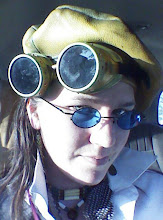Since deciding to become a writer I've discovered one of the best parts about being one is that you can be whoever you want to be. Feel like fighting a gang of train robbers in the old west? Done. Want take the fashion world by storm with killer designs while moonlighting as a super hero at night? Done. How about being a a hacker who works like a modern Robin Hood in the digital age? DONE!
I can be all and any of these things through my writing with a little research, time, and effort. Also, notes help.
At the end of the day, however, I'm still Kit with a thousand different facets. Being a writer for me means being more than one person; it means that sometimes I'm the villain, the hero, and the anti-hero. In DnD terms it means being lawful good, good, neutral, evil, chaotic, and sometimes a combination of those. (I like to mix things up.) Being a writer means--sometimes--having a million different interests to interweave into the character you become for a short time period.
But, it's more than that too.
Fahrenheit 451, written by one Ray Bradbury (my favorite writer of all time), was about a dystopian world in which firefighters burned books and mass censorship was the norm. Bradbury's key message through his character Montag was that censorship hurts. Changing something after it's written to suit the needs of society takes away from what it was. To him, it ruined not only books, their message, but the reader as well. And he sought to deliver this message to people through his novel.
While it's true that not every book has a message, or an agenda as some people might refer to it as, it is true that as a writer you can explain your views through your writing--through story and characters that count. This has always been one of my bigger goals as a writer. It makes of the very core of who I am--my identity--as a writer.
I like to tell a story that resonates and helps people see or feel something they might not have before.
As Carlos Fuentes said:











